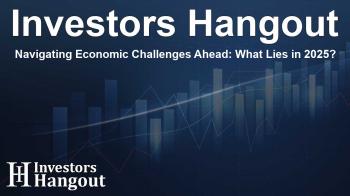Navigating Economic Challenges Ahead: What Lies in 2025?

Understanding the Economic Landscape for 2025
The global economy is presents an intricate web of challenges as we move towards 2025. As we finally start to see the effects of recovery from the COVID-19 pandemic, a new array of obstacles has emerged on the horizon. In 2024, major central banks worldwide found an opportunity to reduce interest rates, having successfully curtailed inflation without plunging the world into recession.
The Impact of Political Shifts
Unexpectedly, despite positive economic signals such as soaring stock prices recorded in the United States and Europe, individuals felt increasingly discontent with their living situations. Voters across various nations—including prominent democracies—expressed their dissent in an election cycle marked by a heightened cost of living and post-pandemic price hikes. They made it clear that political leaders needed to address these rising economic challenges rather than ignoring them.
Potential Consequences of Economic Policies
Looking ahead to 2025, the situation may worsen, particularly if trade tensions escalate due to new tariffs. If policies from influential leaders are enforced, the chances of rekindling inflation or triggering a global economic slowdown could increase dramatically. This potential economic turmoil may also lead to higher unemployment rates, combating the current trend of near-record low figures.
Global Conflicts and Economic Risks
Moreover, ongoing geopolitical conflicts, particularly those in Eastern Europe and the Middle East, coupled with persistent political deadlocks in Europe's heavyweights such as Germany and France, add layers of uncertainty to the economic forecast. A growing concern shared among many nations is the financial cost incurred due to climate change-related damage, which continues to affect their national budgets.
The State of Developing Nations
The World Bank has indicated that the poorest nations are currently experiencing the most significant economic strain in decades, struggling to recover from the adverse effects of the pandemic. These already fragile economies could face further setbacks from unfavourable trade conditions and restrictive funding opportunities. Stable economies are crucial in addressing these future challenges effectively.
Health of National Economies
Against this backdrop, governments worldwide must find ways to reassure their populations, many of whom believe their financial futures are dim. Failing to address public sentiment can lead to political instability and an increase in extremist movements. As national budgets maintain their focus on pandemic-related issues, such as climate change and increased military spending, the challenge remains: how to fund these priorities without deepening national debt.
Debt Concerns and Financial Stability
Continuing an approach of accumulating debt could sow the seeds for significant financial crises. Policymakers must tread carefully to avoid a precarious situation. As European Central Bank President Christine Lagarde pointed out, uncertainty is expected to abound in 2025.
Uncertainties Ahead: What Can Be Expected?
Will new tariffs be imposed at such high rates, and will they affect certain sectors disproportionately? The intricacies of international trade negotiations will play a crucial role, where retaliation may further complicate matters. Additionally, the world's second-largest economy, China, finds itself at a crossroads, needing to transition away from a manufacturing-heavy economy to boost the purchasing power of its lower-income citizens.
Addressing Europe's Economic Challenges
As for Europe, the pressing need to tackle the underlying issues that have hindered its economic progress, including investment deficits and skill shortages, is more critical than ever. Political resolutions in Germany and France will likely be paramount for any substantial recovery efforts.
The Broader Implications of Global Events
Meanwhile, the repercussions of U.S. trade policies and their potential to stir inflation pose challenges for many global economies, particularly those reliant on dollar-denominated debt. Furthermore, the unpredictable consequences of ongoing conflicts, including those in Ukraine and the Middle East, could influence energy costs worldwide.
In conclusion, while policymakers are optimistic that the global economy can navigate through these disturbances, they face a significant uphill battle. The International Monetary Fund's announcement emphasizes the necessity of preparedness for uncertain times, as the repercussions of today's decisions linger ahead.
Frequently Asked Questions
What major challenges is the global economy expected to face in 2025?
The global economy faces challenges such as inflation, trade tensions, and political instability that may affect growth prospects.
How might U.S. tariffs influence global economic conditions?
Potential tariffs could reignite trade wars, leading to inflation and affecting both domestic and global economic stability.
What are the consequences for developing nations in 2025?
Developing nations may struggle with economic instability as they have missed the post-pandemic recovery and face restrictive trade and funding conditions.
Why is national debt a concern for governments?
Accumulating debt may lead to financial crises, making it crucial for governments to balance spending priorities with economic health.
What role do geopolitical conflicts play in global economic forecasts?
Geopolitical conflicts can significantly impact energy costs and economic stability, adding layers of uncertainty to forecasts.
About The Author
Contact Ryan Hughes privately here. Or send an email with ATTN: Ryan Hughes as the subject to contact@investorshangout.com.
About Investors Hangout
Investors Hangout is a leading online stock forum for financial discussion and learning, offering a wide range of free tools and resources. It draws in traders of all levels, who exchange market knowledge, investigate trading tactics, and keep an eye on industry developments in real time. Featuring financial articles, stock message boards, quotes, charts, company profiles, and live news updates. Through cooperative learning and a wealth of informational resources, it helps users from novices creating their first portfolios to experts honing their techniques. Join Investors Hangout today: https://investorshangout.com/
The content of this article is based on factual, publicly available information and does not represent legal, financial, or investment advice. Investors Hangout does not offer financial advice, and the author is not a licensed financial advisor. Consult a qualified advisor before making any financial or investment decisions based on this article. This article should not be considered advice to purchase, sell, or hold any securities or other investments. If any of the material provided here is inaccurate, please contact us for corrections.

